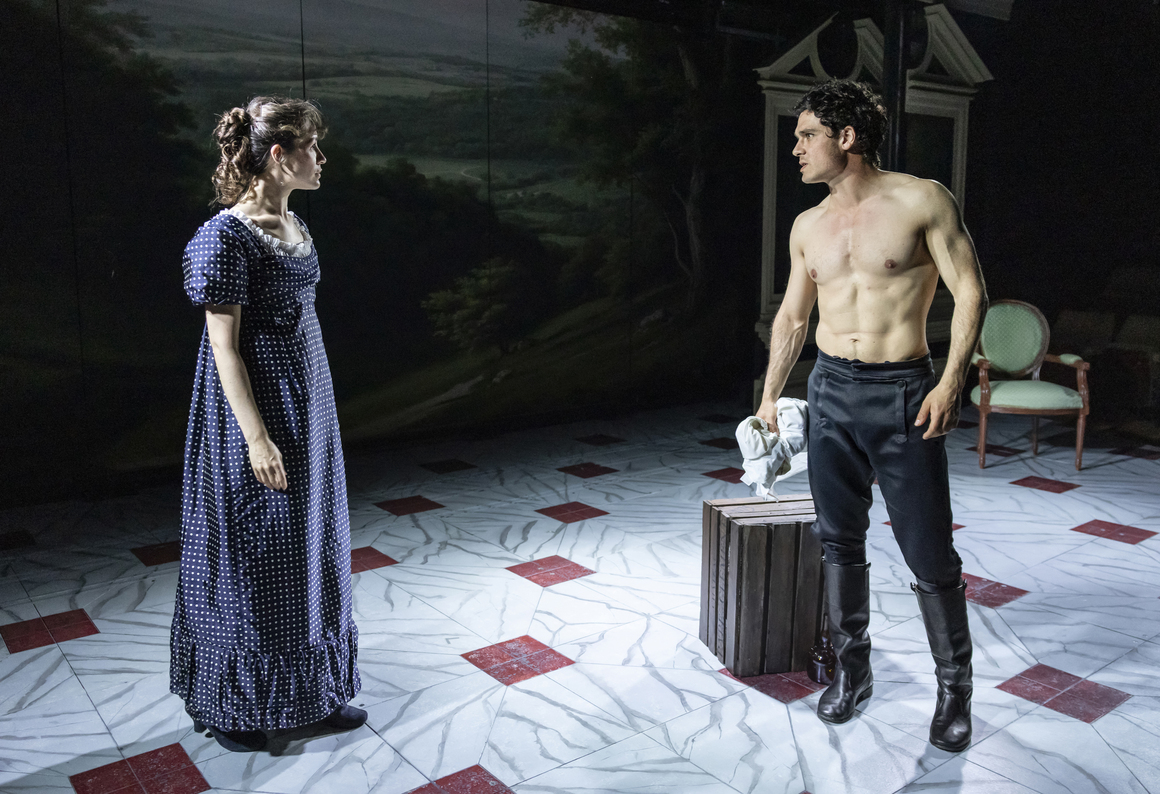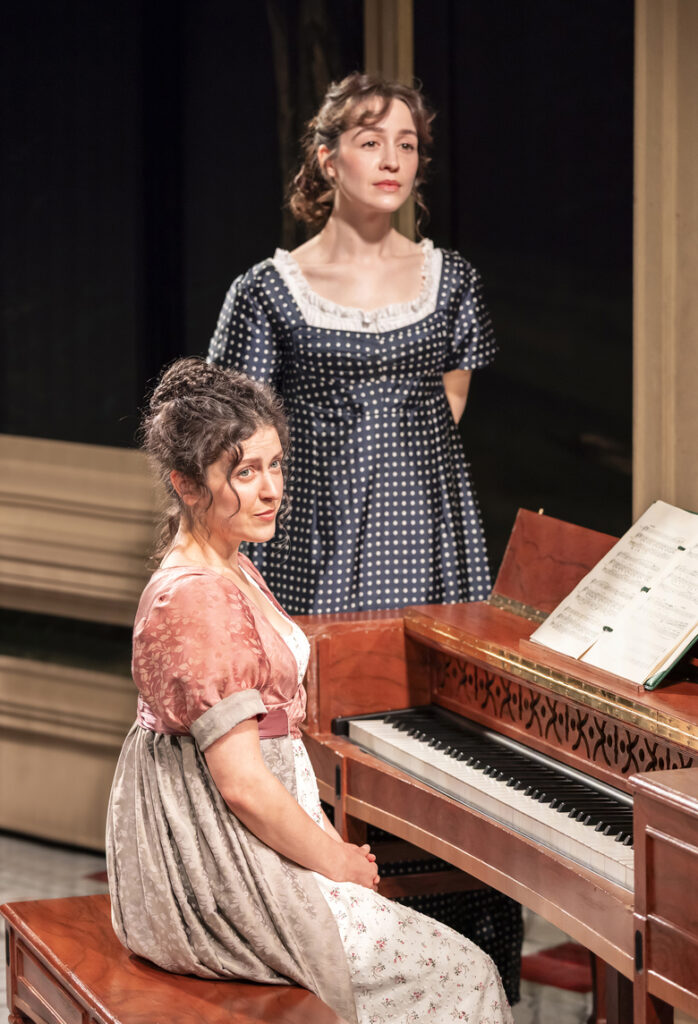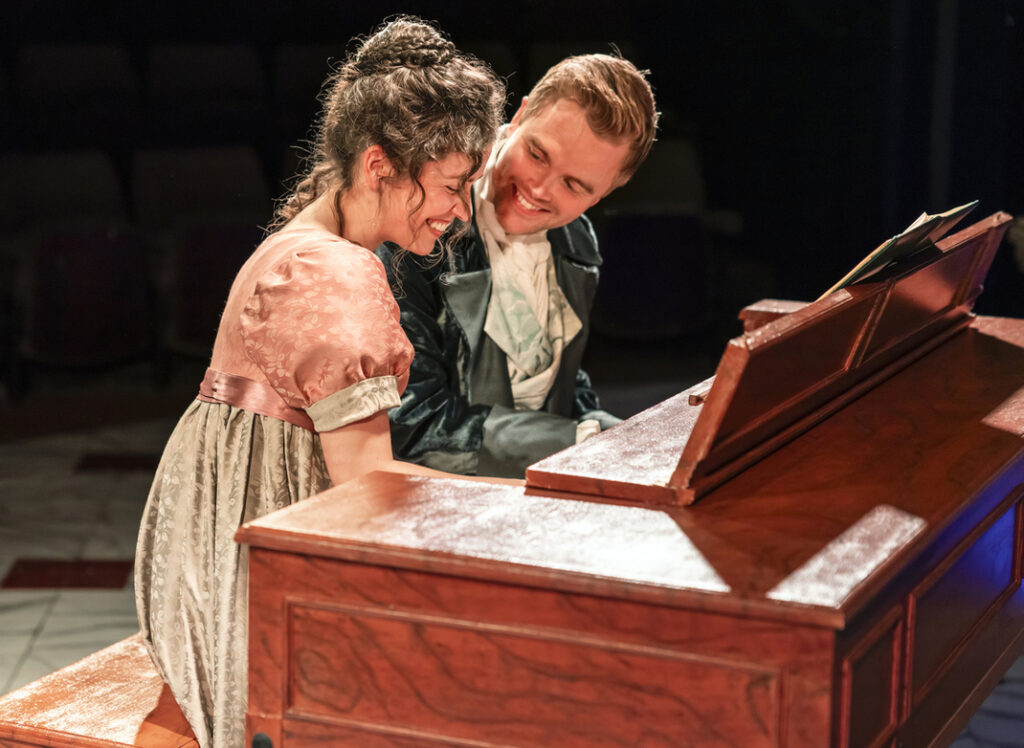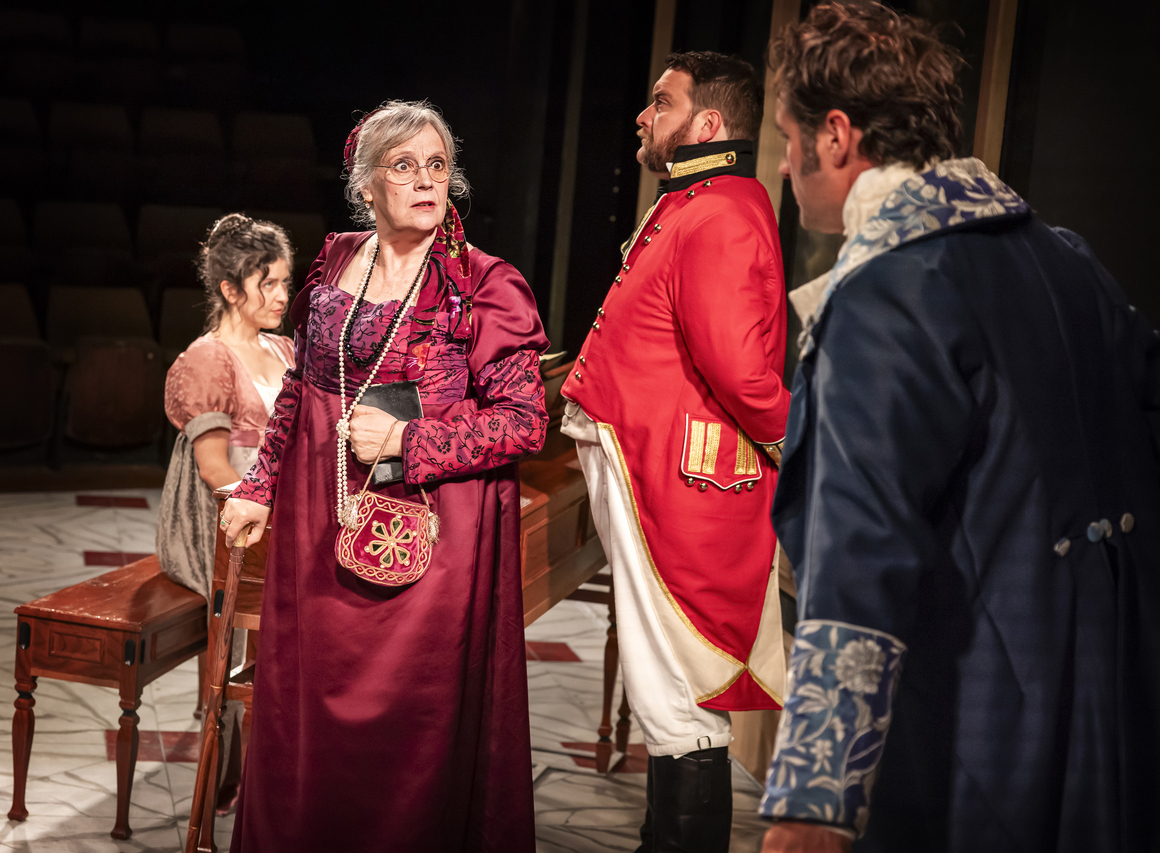Review by Simon Jenner, September 2 2025
★★(★)
It is a truth universally acknowledged that an Austen spin-off will money-spin its way to the stage and tour. And that line’s original is wickedly wielded here by Elizabeth née Bennett, now Darcy. Jane Austen’s 250th, P.D. James’ last novel dramatized by Duncan Abel and Rachel Wagstaff (known for her thrilling, evolving adaptation of Birdsong), coming to a Regency Theatre built in 1807. With Death Comes to Pemberley directed by Jonathan O’Boyle at Theatre Royal Brighton till September 6th, what’s not to love?
Lovelessness perhaps. You don’t feel there’s enough at stake here, true dramatic tension to release. There’s also some unexpected compensations, not least the superb music. When the real class acts are often the servants, you sense style has been turned upside down, and led into the privy (which looms in one of the best scenes). To start with, it’s not anyone’s fault on stage nor most of the stylish creatives. It’s down to the director and these normally gifted writers that some of the dialogue in this still relatively sparkling novel – which worked well on film – flops dead as a salmon in a fishmonger’s basket.
Or Captain Denny in a wood. From where the mystery of whodunnit unfolds with louche-but-luckless Mr Wickham (Adrian Lukis only recently reprising his Being Mr Wickham at Jermyn Street too) arraigned for the murder. Well he was covered in his closest friend’s blood. And they had been quarrelling. Bitterly. There’s a pistol mystery that never resolves itself. And thirty pounds in a hat which does.
And above all: will the Pemberley Ball go ahead? If it doesn’t Napoleon might well feel the time’s ripe to invade.

Jamie-Rose Duke and Sam Woodhams. Photo Credit: Pamela Raith
Tensions in the marriage of Darcy and a sadder, mature Elizabeth (taken by James Bye and Jamie-Rose Duke) would be more poignant if they conveyed what century they were in. Again most forelock-doffers do, but not some of their lonely betters. That’s despite Elizabeth declaring stagily: “Here we are at the beginning of a new century.” Just so we know it’s set (in 1803) six years after the original (1797) version of Pride and Prejudice was written, as First Impressions.
The two leads look the part, in a Firth-Ehle manner forever now imprinted on the DNA of Pride and Prejudice. And there’s chemistry too. Though earlier on, and like others in the cast, projection is muffled; and style, even vocal panache unbuttons itself as much as one of the characters, betraying all to Elizabeth. Duke is making her assured stage debut and deserves better direction. She has poise and point, though sounds a little doubtful and contemporary. This could so easily be remedied with delivery and stylishness. You feel the betters should consult the servants. “It’s the… ah start of the nineteenth century, sir, but not the middle. And may I suggest…?”
The strain of melancholy elicited by James (for a particular reason built in more happily here) has given way to tense stand-offs and early feminist stirrings (Mary Wolstencraft is surely an uninvited house guest, but kept like all good madwomen in the attic). Darcy must be contrite. Again. Bye seems like Duke musing time travel and not quite finding his way back, turning away much of the time. Colin Firth’s brooding hangs heavy over subsequent Darcys, like an invisibility cloak they forget to shrug off. Bye breaks through when Darcy’s most unjust, and knows it. Bye and Duke have each other’s gleam though, and there’s another couple with a real spark.
Sean Rigby provides a bluff roast-beef Colonel Fitzwilliam suspiciously burning a paper in a grate, but otherwise bracingly military vocally; and devilishly keen on Darcy’s sister Georgiana (Celia Cruwys-Finnigan who has appeal, sparkle and life you believe in). Pity he’s three times her age, and her cousin; but she was fond of her grandfather. Georgiana’s other suitor Henry Alveston (David Osmond) can also sing as well as bring a dash of youthful bashfulness. And he’s a hero in more than one sense. Osmond made the period musical arrangements here, mainly consisting of Irishman John Field, including one of the Nocturnes he invented before Chopin, turned into an aria he sings; and Beethoven’s Waldstein and the Op 26 Sonata, with its funeral march ‘played’ by Georgiana at the close of Act One. Ironically it’s for the moral death of a hero, and Napoleon at that; a little joke of Osmond’s. The musical choices including some pastiche are one of the highlights: that’s with sound designer Elizabeth Purnell lending her distinction as theatre composer.
Above all though, you believe in these lovers. Winning and funny, they say nearly everything in music, till they have to use words: Cruwys-Finnigan’s shy dash for love as Georgiana; Osmond’s octave leap of empathy. Their misunderstandings, crafted by James, are believable, their harmonies, well entwined. And they’re playing live!

Celia Cruwys-Finnigan and Jamie-Rose Duke. Photo Credit: Pamela Raith
Todd Boyce nasals his way nattily as Justice Sir Selwyn Hardcastle; who loves procedure, standing in for a non-existent police super. James has hinted complexity and Boyce laconically brings it out. Hardcastle’s Janus-faced gaze at a judgmental open-and-shut past, contrasts cannily with a stare at future policing. Graceful submission to Elizabeth’s superior judgement shows he can grow. Sam Woodhams glows as a rather dashed Wickham with a rippling torso (“wet shirt? Nah – I can better that!”) and fine last speech; and (more than rather well) the invalid Will Bidwell, torquing his frame to spasm. Will’s dying of consumption whilst protesting he couldn’t possibly Mrs Darcy, to Elizabeth. Who awkwardly has to tell her inferiors she’s not patronising them: as if scanning the lifestyle section of a 1996 The Lady.
Sarah Berger in her dual roles holds up both Lady Catherine de Bourgh as if she was Lady Bracknell’s great-grandmother (the writing rising to this), in a burgundy dress that looks like Laura Ashley curtains, as one theatre director observed (and of Elizabeth’s second dress, in costumes otherwise excellent). Blowing away the character’s “obstinate girl!” pomposity, Berger is consummate. She reinvents Lady C with crystal diction to incise glass, knowing exactly where she is. Just as she does as Mrs Bidwell, all forelock, flurry and over-protection of a daughter. Her physicality’s entirely different.
Indeed older chameleons abound. Paul Jerricho ably silver-surfs his way through servant Mr Bidwell, brandy-chasing Scottish Doctor McFee, Jim Patt another servant and the basilisk Judge, words falling like tombstones.
Two younger actors multi-role dizzingly. Mogali Masuku has no chance with the few wails attached to Lydia Wickham whose shade must be furious she’s not even a small character in this pageant; and is sent packing to bed with smelling salts, just like her mother. As Betsy, Masuku has little to do either; but as Louisa Bidwell she’s allowed an unbuttoning passion, a reckoning and epiphanic radiance.
Like Berger, Louise Faulkner brings a true measure of distinction to each role. As ghost-spotting servant Joan, all rustic fright and curtsey, she’s a caution of reliable unreliable witness. As gossipy innkeeper Mrs Piggot she’s a comic turn of a go-on-then type, winking her way to revelations. As Mrs Younge, she brings dignity, distress and mystery to a character known only in the account (in P&P) Darcy made to Elizabeth in his first letter to her. Younge provides one of the occasions to make Elizabeth observe (frequently) that male obsession with ‘honour’ makes them act dishonourably: a shining sliver of vintage James; which Duke brings off with understated truth.
This adaptation seems to have crammed everyone in, but in truth it’s sensibly thinned out some attendant Bennetts. Nevertheless the problem with the remainder is that we get expositions and walk-ons, not enough leading angst. We don’t get time to breathe or occasionally care if they’re breathing.
Bar one or two dresses, Natalie Titchener’s costumes are shimmering period creations, swept to advantage in Dr Helen Davidge’s period dance advice; decorous, rather than fully choreographed. Mike Robertson occasionally spotlights but brings atmosphere and lightning to his half-lit scenes and terraced depths. Often the set glows or throws deep Tenebrae round tensions. Sean Cavanagh’s set has put off some; but it’s stylish: sliding panels with transparent porticos doing service as grand doors sloughed. They reveal an eighteenth-century backdrop hinting Gainsborough-styled woods. This occasionally opens to stark depths, but much is foregrounded on the unchanging white marble floor picked out in cadmium red, with a square piano trundled about. Theatre Royal seems its ideal home.
Death Comes to Brighton, sorry Pemberley needs to be dead in the right places. And in one or two exchanges, alive. Happily there’s stylishness in the fixtures, truth in the lower orders, some superb acting by the likes of Berger, Boyce, and Faulkner, as well as two couples with chemistry: in particular Cruwys-Finnigan and Osmond and the latter’s music that should (with Purnell) be up for some award. It’s still moving and cosy to contemplate two couples at the end, and know that it’s always 1800 or 1810, our brave forces are thrashing Napoleon, the empire is about to make us Top Nation, and nothing will ever really happen again.
Associate Sound Designers, Graham Weymouth, Henry Horn, Musical Director/Arranger David Osmond, Casting Director Kate Plantin CDG, Dance Advisor Dr Helen Davidge.
Producers Sally Hughes, Adam Rolston, Rishi Anand. Tour Booker New Road Theatricals, Production Manager Nick My, CSM Dominic Whiffin, DSMs Andrea Duncan, Linnea Friden Gronning, Lighting Technician Ashley Cashfield, Head of Wardrobe Laura Brown, Wardrobe Supervisor Ella Coolley.
Photo Credit: Pamela Raith.
Celia Cruwys-Finnigan and David Osmond. Photo Credit: Pamela Raith



